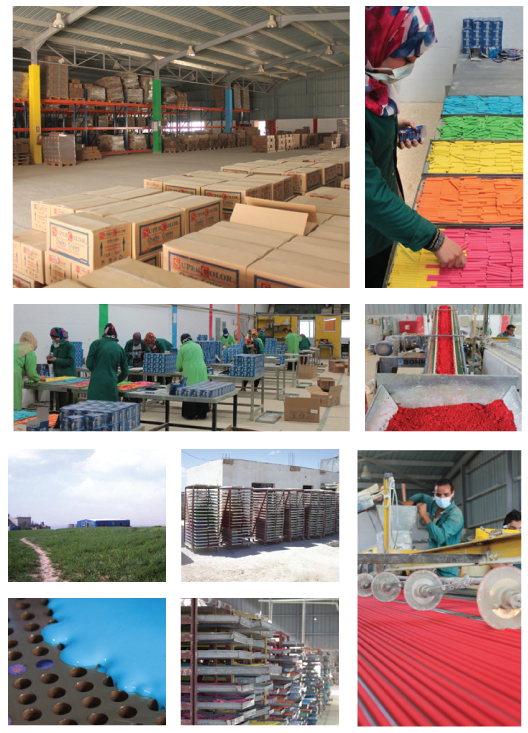
Jordan Chalk is a family business that was established in 2002. It is specialized in providing and manufacturing high quality products through using unique raw materials comprised of calcium carbonate and calcium sulfate found in huge quantities across Jordan. This has enabled us to export 98% of our product to over 100 countries, of which are numerous well-known brands.
Being worldwide pioneers in producing different kinds and shapes of chalk, Jordan Chalk is recognized and distinguished among its competitors for providing:
•Private label services; as we promote a complete convenient and affordable turnkey private label solutions.
• Unique product; where we supply our clients with unique customized products in the global market
• High Quality products; since all our products go through the highest standards of quality control.
• Competitive prices; in our ongoing goal to meet our clients’ and market needs in terms of cost, we keep abreast with who our competitors are in the market and what they offer so we can meet demands.
• Delivery time; with the expansion of our Company and services throughout the world, we make sure to maintain on time delivery to meet our clients’ satisfaction.
Our History:
1995_2002 - In 2002 The Moulded Chalk Plant was established in Al’aa village south of Jordan by founder Mr. Salah Aloqbi.
2003_2007 - Introduced Dustless chalk, which is based on using calcium carbonate and was produced by developing our know how techniques.
2008_2009 - Established a semi-automatic extrusion chalk plant.
- Jordan chalk started exporting to more than 50 countries worldwide.
2010_2012 - Increased Dustless chalk production capacity 4 times in order to meet customers’ needs and market demands.
- March 11 marks the day His Majesty king Abdullah ll paid the Jordan Chalk Factory in Al’aa village a visit.
2013_2014 - Re-located the Chalk Factory to Karak industrial zone on area of 7500 sqm. Thus, increasing our capacity by 40% in order to meet our client’s demands across more than 100 countries worldwide.

There are two ways of making chalk;
Molding Process
The moulded method , produces chalk which is softer than the extruded chalk, and is NOT dustless. Dry pigment and water are first mixed in preparation for the addition of plaster of Paris. Because plaster begins to set quickly, this process must be carefully timed and supervised.
Before the mixture gets too thick, it is poured into a molding machine with many holes that are the exact size and shape of the finished pieces of chalk.
Excess chalk “batter” is scraped off the tops of the moulds, and after a setting of five to eight minutes, depending upon the particular color being manufactured, the sticks of chalk are popped out onto a tray which is then stacked in a large drying rack.
Extrusion Process
To produce extruded chalk, the makers first stir together, by machine, several white powders. The most important of these is calcium carbonate and water-washed clay. If the chalk is to be colored, the particular color is likewise added in the form of dry, finely ground pigments.
After all of the powders are well mixed, they are transferred to another large machine where a liquid “binder” is poured in to hold the dry particles together.After the powders and their binder have swished around for a certain length of time, the chalk forms a kind of dough which looks like many small balls about the size of marbles. These little dough balls are then machine-pressed into a large, long shape, just like a solid cylinder.
This shape is called a cartridge. As a result of this pressing, air is forced out of the dough, and the moist particles in the dough are very closely bound to one another causing the chalk to be heavy and smooth textured.The cartridge, which is still damp and pliable, is then inserted into another machine called an extrusion press, where it is forced through a small tube. As the long rope of wet chalk comes out, an automatic slicer cuts it into many pieces. These pieces roll down to a tray, and are ready to be cut again into regular size sticks of chalk 80 mm. Since the pieces are still quite moist, they must be dried in large ovens, called kilns, before they become hard enough to be packed.Extruded chalk was described as “dustless”.
In the case of extruded chalk, however, the dust particles are weighted to fall straight down instead of flying through the air to make dust. In other words, the dust in “dustless” chalk is chemically controlled.Both molded and extruded chalks are manufactured in a variety of colors and shapes.
There are round sticks, long square ones, Triangle, and their uses are varied. Chalks made for school and home are different from those needed in an art studio or factory; and just as in a family, no two members are alike even though they may resemble one another.